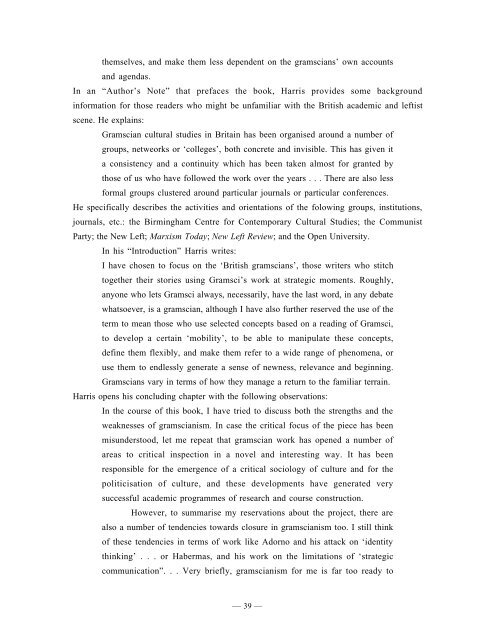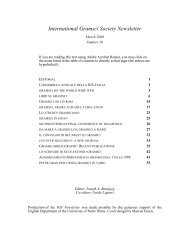Newsletter - International Gramsci Society
Newsletter - International Gramsci Society
Newsletter - International Gramsci Society
Create successful ePaper yourself
Turn your PDF publications into a flip-book with our unique Google optimized e-Paper software.
themselves, and make them less dependent on the gramscians’ own accounts<br />
and agendas.<br />
In an “Author’s Note” that prefaces the book, Harris provides some background<br />
information for those readers who might be unfamiliar with the British academic and leftist<br />
scene. He explains:<br />
<strong>Gramsci</strong>an cultural studies in Britain has been organised around a number of<br />
groups, netweorks or ‘colleges’, both concrete and invisible. This has given it<br />
a consistency and a continuity which has been taken almost for granted by<br />
those of us who have followed the work over the years . . . There are also less<br />
formal groups clustered around particular journals or particular conferences.<br />
He specifically describes the activities and orientations of the folowing groups, institutions,<br />
journals, etc.: the Birmingham Centre for Contemporary Cultural Studies; the Communist<br />
Party; the New Left; Marxism Today; New Left Review; and the Open University.<br />
In his “Introduction” Harris writes:<br />
I have chosen to focus on the ‘British gramscians’, those writers who stitch<br />
together their stories using <strong>Gramsci</strong>’s work at strategic moments. Roughly,<br />
anyone who lets <strong>Gramsci</strong> always, necessarily, have the last word, in any debate<br />
whatsoever, is a gramscian, although I have also further reserved the use of the<br />
term to mean those who use selected concepts based on a reading of <strong>Gramsci</strong>,<br />
to develop a certain ‘mobility’, to be able to manipulate these concepts,<br />
define them flexibly, and make them refer to a wide range of phenomena, or<br />
use them to endlessly generate a sense of newness, relevance and beginning.<br />
<strong>Gramsci</strong>ans vary in terms of how they manage a return to the familiar terrain.<br />
Harris opens his concluding chapter with the following observations:<br />
In the course of this book, I have tried to discuss both the strengths and the<br />
weaknesses of gramscianism. In case the critical focus of the piece has been<br />
misunderstood, let me repeat that gramscian work has opened a number of<br />
areas to critical inspection in a novel and interesting way. It has been<br />
responsible for the emergence of a critical sociology of culture and for the<br />
politicisation of culture, and these developments have generated very<br />
successful academic programmes of research and course construction.<br />
However, to summarise my reservations about the project, there are<br />
also a number of tendencies towards closure in gramscianism too. I still think<br />
of these tendencies in terms of work like Adorno and his attack on ‘identity<br />
thinking’ . . . or Habermas, and his work on the limitations of ‘strategic<br />
communication”. . . Very briefly, gramscianism for me is far too ready to<br />
— 39 —



